Emomali Rahmon
Emomali Rahmon (Tajik: Эмомалӣ Раҳмон, romanized: Emomalî Rahmon/Emomalī Rahmon;[lower-alpha 1] [emɔmæli ɾæhmɔn]; born 5 October 1952) is a Tajik politician who has served as President of Tajikistan (or its equivalent post) since 1992.[1][2] While he has been praised for bringing stability to Tajikistan after the Tajik Civil War,[3][4] he is regarded as an authoritarian, with groups such as Human Rights Watch citing the jailing of government critics, a campaign to force the return of exiled political dissidents abroad and crackdowns on freedom of expression and freedom of belief.[5][6][7] He has also been accused of extensive nepotism.[8][9][10]
Leader of the Nation Emomali Rahmon Эмомалӣ Раҳмон | |
|---|---|
.jpg.webp) Emomali Rahmon in 2016 | |
| 3rd President of Tajikistan | |
| Assumed office 20 November 1992 Acting to 16 November 1994 | |
| Prime Minister | Abdumalik Abdullajanov Abdujalil Samadov Jamshed Karimov Yahyo Azimov Oqil Oqilov Kokhir Rasulzoda |
| Preceded by | Rahmon Nabiyev Akbarsho Iskandrov (Acting) |
| Leader of the People's Democratic Party | |
| Assumed office 10 December 1994 | |
| Preceded by | Position established |
| Personal details | |
| Born | Emomali Sharipovich Rahmonov 5 October 1952 Kulob, Tajik SSR, Soviet Union (now Tajikistan) |
| Political party | People's Democratic Party (1994–present) |
| Other political affiliations | Communist Party (1990–1994) |
| Spouse(s) | Azizmo Asadullayeva |
| Children | 9, including Ozoda and Rustam |
| Parents | Sharif Rahmonov Mayram Sharifova |
| Alma mater | Tajik State National University |
| Military service | |
| Allegiance | |
| Branch/service | |
| Years of service |
|
| Rank | Able seaman (1971-1974) General of the Army (since 1992) |
Early life
Rahmon was born as Emomali Sharipovich Rakhmonov (Russian: Эмомали́ Шари́пович Рахмо́нов, romanized: Emomalí Šarípovič Rahmónov [ɛmomælʲi ʂaripovitɕ ramonov])[11] to Sharif Rahmonov and Mayram Sharifova, a peasant family in Danghara,[12] Kulob Oblast (present-day Khatlon province). From 1971 to 1974, he served in the Soviet Union's Pacific Fleet, during which he was stationed in the Primorsky Krai. After completing the military service, Rahmon returned to his native village where he worked for some time as an electrician.[13]
As rising apparatchik in Tajikistan, he became a chairman of the collective state farm of his native Danghara. According to his official biography, Rahmon graduated from the Tajik State National University with a specialist's degree in economics in 1982. After working for several years in the Danghara Sovkhoz, Rahmon was appointed chairman of the sovkhoz in 1987.[2]
Politics
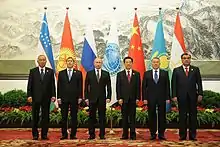
.jpg.webp)
In 1990, Rahmon was elected a people's deputy to the Supreme Soviet of the Tajik SSR.[14] President Rahmon Nabiyev was forced to resign in the first months of the Civil War in Tajikistan in August 1992. Akbarsho Iskandarov, Speaker of the Supreme Soviet, became acting president. Iskandarov resigned in November 1992 in an attempt to end the civil unrest. That same month, the Supreme Soviet met in Khujand for its 16th session and declared Tajikistan a parliamentary republic. Rahmon was then elected by the members of the Supreme Soviet as its chairman—a post equivalent to that of president—and the head of government.[14] Former Interior Minister Yaqub Salimov later recalled that Rahmon's appointment was made because he was “nondescript”, in which other field commanders thought that he could be cast aside "when he had served his purpose."[15][16]
During the civil war that lasted from 1992–97, Rahmon's rule was opposed by the United Tajik Opposition. As many as 100,000 people died during the war. He survived an assassination attempt on 30 April 1997 in Khujand,[17] as well as two attempted coups in August 1997 and in November 1998.
| Presidential styles of Emomali Rahmon | |
|---|---|
| Reference style | Ҷаноби Олӣ, Президенти Ҷумҳурии Тоҷикистон. "His Excellency, the President of Tajikistan" |
| Spoken style | Президенти Тоҷикистон "President of Tajikistan" |
| Alternative style | Асосгузори сулҳу ваҳдати миллӣ – Пешвои миллат "Founder of Peace and National Unity – Leader of the Nation" |
In 1994, a new constitution reestablished the presidency. Rahmon was elected to the post on 6 November 1994 and sworn in ten days later. Following constitutional changes, he was reelected on 6 November 1999 to a seven-year term, officially taking 97% of the vote. On 22 June 2003, he won a referendum that would allow him to run for two more consecutive seven-year terms after his term expired in 2006. The opposition alleges that this amendment was hidden in a way that verged upon electoral fraud. Rahmon was reelected to a seven-year term in a controversial election on 6 November 2006, with about 79% of the vote, according to the official results. On 6 November 2013, he was reelected for the second seven-year term in office, with about 84% of the vote, in an election that the Organization for Security and Co-operation in Europe said lacked "genuine choice and meaningful pluralism".[18] In October of 2020, he was once again re-elected as President for a fifth term with a margin of 90.92%,[19][20] amid allegations of fraud.[21]
.jpg.webp)

In December 2015, a law passed by Tajikistan's parliament gave Rahmon the title "Founder Of Peace and National Unity, Leader of the Nation" (Tajik: Асосгузори сулҳу ваҳдати миллӣ – Пешвои миллат, Asosguzori sulhu vahdati millî – Peşvo‘i millat; Russian: Основатель мира и национального единства – Лидер нации, Osnovatel mira i natsionalnogo yedinstva – Lider natsii).[22] A shorter version of the title, "Leader of the Nation," is used frequently. In addition to granting Rahmon lifelong immunity from prosecution, the law also gave him a number of other lifelong privileges, including veto powers over all major state decisions, the freedom to address the nation and parliament on all matters he deems important, and the privilege of attending all government meetings and parliament sessions.[23][24]
On 22 May 2016, a nationwide referendum approved a number of changes to the country's constitution.[25] One of the main changes lifted the limit on presidential terms, effectively allowing Rahmon to stay in power for as many terms as he wishes.[26] Other key changes outlawed faith-based political parties, thus finalizing the removal of the outlawed Islamic Revival Party from Tajikistan's politics, and reduced the minimum eligibility age for presidential candidates from 35 to 30, enabling Rahmon's older son, Rustam Emomali, to run for president any time after 2017.[27] In January 2017, Rustam Emomali was appointed Mayor of Dushanbe, a key position, which some analysts see as the next step to the top of the government.[28]
According to the US ambassador in Tajikistan, Rahmon's government is characterized by cronyism and corruption. Rahmon and his family control the country's major businesses, including the largest bank.[29] In November 2018, Rahmon launched a hydroelectric station to solve energy problems.[30]
Name changes
In March 2007, Rahmonov changed his surname to Rahmon, getting rid of the Russian-style "-ov" ending.[31] He also removed the patronymic, Sharipovich, from his name altogether. Rahmon explained that he had done so out of respect for his cultural heritage.[32][33] Following the move, scores of governments officials, members of parliament, and civil servants around the country removed Russian-style patronymics and "-ov" endings from their surnames. In April 2016, Tajikistan officially banned giving Russian-style patronymics and surnames to newborn children.[34]
Religion and convictions
Rahmon is a Sunni Muslim and has frequently stressed his Muslim background even though his administration is engaged in a relentless campaign against public displays of Islamic devotion.[35] His suppression of Islamic expression includes banning beards, attendance at mosque for women and children under 18, hajj for people under 40, studying in Islamic schools outside Tajikistan, the production, import or export of Islamic books without permission (implemented in 2017), using loudspeakers to broadcast the adhan, veils, madrassas, Islamist political parties and Arabic-sounding names (implemented in 2016). Furthermore, mosques are heavily regulated, providing unofficial Islamic teaching can lead to up to 12 years of imprisonment, and an arduous process is required to obtain a permit to establish an Islamic organisation, publish an Islamic book, or go on pilgrimage to Mecca.[36] In January 2016, Rahmon performed an Umrah with a number of his children and senior members of his government. That was Rahmon's fourth pilgrimage to Mecca.[37]
His reply to critics of the election standards of the 2006 Tajikistani presidential elections was:
"In Tajikistan, more than 99 percent of those residing here are Muslim. We have a completely different culture. You have to take that into account".[38]
During a 2010 Organisation of Islamic Cooperation session in Dushanbe, Rahmon spoke against what he called the misuse of Islam for political ends, claiming that "Terrorism, terrorists, have no nation, no country, no religion... Using the name 'Islamic terrorism' only discredits Islam and dishonors the pure and harmless religion of Islam."[39]
Membership in Hizb ut-Tahrir, a militant Islamic party that aims to overthrow secular governments and unify Tajiks under one Islamic state, is illegal and members are subject to arrest and imprisonment.[40]
The Islamic Renaissance Party of Tajikistan (IRP) is a banned Islamist political party and has been designated a terrorist organization since 2015.[41][42]
In 2017 the government of Tajikistan passed a law requiring people to "stick to traditional national clothes and culture", which has been widely seen as an attempt to prevent women from wearing Islamic clothing, in particular the style of headscarf wrapped under the chin, in contrast to the traditional Tajik headscarf tied behind the head.[43]
Personal life
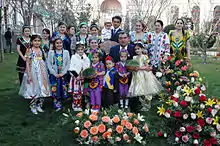
He is married to Azizmo Asadullayeva and has nine children: seven daughters and two sons.[44] Two of his children, Rustam Emomali and Ozoda Rahmon, are senior officials in his administration,[45][46] while another, Zarina Rahmon, was appointed deputy head of Orienbank in January 2017.[47][48] Rustam is believed to be prepared by his father to succeed him as leader of Tajikistan.[49]
Honors and awards
_1.jpg.webp)
- Honorary Doctorate of Leadership by the Limkokwing University of Creative Technology (LUCT)[50][51]
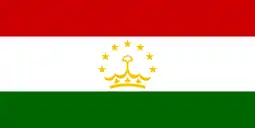 Hero of Tajikistan
Hero of Tajikistan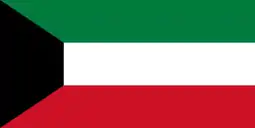 Order of Mubarak the Great
Order of Mubarak the Great Order of Prince Yaroslav the Wise (2008)
Order of Prince Yaroslav the Wise (2008) Order of the Three Stars (2009)
Order of the Three Stars (2009)- World Peace Prize Harvester's Prize (2000) [52]
 Order of Merit of Ukraine (2011)
Order of Merit of Ukraine (2011) Heydar Aliyev Order (2012)
Heydar Aliyev Order (2012)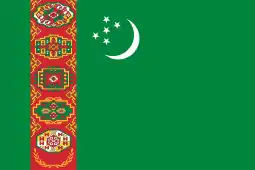 Order of the President of Turkmenistan (2012)
Order of the President of Turkmenistan (2012) Order of the Republic of Serbia (2013)[53]
Order of the Republic of Serbia (2013)[53] Order of Alexander Nevsky (2017)[54]
Order of Alexander Nevsky (2017)[54]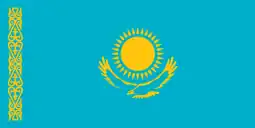 Order of Parasat (2018)[55]
Order of Parasat (2018)[55]
Notes
- Birthname appears variously as Emomali Sharipovich Rakhmonov, Imamali Sharipovich Rakhmanov or Imomali Sharipovich Rakhmonov; all transliteration into English of the Russian forms (Эмомали Шарипович Рахмонов and Имамали Шарипович Рахманов) of his Tajik name.
References
- Samuels, Gabriel. "The country that just voted to allow its president to rule forever". Independent.
- "ЭМОМАЛӢ РАҲМОН [Official Biography]". Official Website of the President of Tajikistan. Retrieved 20 May 2016.
- Sufyan bin, Uzayr. "Tajikstan President Rahmon Brings Stability, But Not Prosperity". fpif.org. Foreign Policy in Focus. Retrieved 30 January 2021.
- Bushuev, Mikhail. "Tajikistan's eternal ruler Emomali Rakhmon". dw.com. DW News. Retrieved 20 January 2021.
- "World Report 2019: Rights Trends in Tajikistan". Human Rights Watch. 2018-12-18. Retrieved 2019-09-19.
- Service, RFE/RL's Tajik (2015-12-11). "Tajik president and his family to get life-long legal immunity". The Guardian. ISSN 0261-3077. Retrieved 2019-09-19.
- "Tajikistan Events of 2020". Human Rights Watch. Human Rights Watch. Retrieved 14 January 2021.
- Putz, Catherine. "A Tale of Tajik Air's Troubles". thediplomat.com. The Diplomat. Retrieved 30 January 2021.
- "Opinion: Tajikistan's crackdown on the free press must end". washingtonpost.com. Washington Post. Retrieved 30 January 2021.
- Putz, Catherine. "Nepotism: Not the Kind of Corruption Tajikistan is Looking For". thediplomat.com. The Diplomat. Retrieved 30 January 2021.
- "Эмомали Рахмон: вехи политической биографии". Asia-Plus. Asia-Plus News Agency. 5 October 2016. Archived from the original on 24 June 2016. Retrieved 20 May 2016.
- "Тарҷумаи Ҳоли Эмомалии Раҳмон". Government of Tajikistan. Retrieved 28 November 2014.
- "Эмомали Рахмон". Сайт Президента Республики Таджикистан. Retrieved 20 May 2016.
- "Emomali Rahmon". Official Website of the President of the Republic of Tajikistan. Retrieved 4 September 2016.
- "Tajikistan: Former Interior Minister In Dushanbe To Face Trial For Treason". RadioFreeEurope/RadioLiberty. Retrieved 2020-10-17.
- "Emomali Rahmon: The Accidental Leader Who Has Stayed In Power For Decades". RadioFreeEurope/RadioLiberty. Retrieved 2020-10-17.
- "Tajikistan - Leninabad: Crackdown In The North". Hrw.org. April 1998. Retrieved 2 June 2014.
- "Republic of Tajikistan, Presidential Election 6 November 2013: OSCE/ODIHR Election Observation Mission Final Report". OSCE/ODIHR. 5 February 2014. Retrieved 20 May 2016.
- Putz, Catherine. "Tajikistan's Presidential Election Yields Expected Results". thediplomat.com. The Diplomat. Retrieved 30 January 2021.
- Abdulkerimov, Bahtiyar. "Tajikistan's president sworn in for 5th term". aa.com.tr. Anadolu Agency. Retrieved 30 January 2021.
- "Amid Fraud Allegations, Results Give Tajikistan's Rahmon Fifth Presidential Term". rferl.org. Radio Free Europe/RadioLiberty. Retrieved 30 January 2021.
- "Қонуни Ҷумҳурии Тоҷикистон дар бораи Асосгузори сулҳу ваҳдати миллӣ – Пешвои миллат". Official Website of the President of Tajikistan. 25 December 2015. Retrieved 20 May 2016.
- "Tajikistan: Leader of the Nation Law Cements Autocratic Path". EurasiaNet.org. 11 December 2015. Retrieved 20 May 2016.
- "Teflon Rahmon: Tajik President Getting 'Leader' Title, Lifelong Immunity". Radio Free Europe/Radio Liberty. RFE/RL's Tajik Service. 10 December 2015. Retrieved 20 May 2016.
- "Tajikistan Approves Constitutional Changes Tightening Rahmon's Grip On Power". Radio Free Europe/Radio Liberty. RFE/RL. 23 May 2016. Retrieved 26 May 2016.
- "Why Does Tajikistan Need A Referendum?". Radio Free Europe/Radio Liberty. RFE/RL. 20 May 2016. Retrieved 20 May 2016.
- "Tajiks to vote in 'president-for-life' referendum". Reuters. 10 February 2016. Retrieved 20 May 2016.
- "Tajikistan: regime eternalization completed?". The Politicon. The Politicon. 26 January 2017. Retrieved 26 January 2017.
- Luke Harding: WikiLeaks cables paint bleak picture of Tajikistan, central Asia’s poorest state, The Guardian, 12 Dec 2010.
- "Tajikistan Launches Giant Power Plant To Tackle Energy Problems". RadioFreeEurope/RadioLiberty. Retrieved 2018-12-04.
- "Рахмонов стал Рахмон, Каримов остался Каримовым [Rahmonov Became Rahmon, Karimov Remained Karimoiv]". Avesta.Tj. Avesta News Agency. 13 April 2007. Retrieved 20 May 2016.
- "Президент Таджикистана сменил фамилию и подкорректировал имя". Сегодня. 22 March 2007. Retrieved 20 May 2016.
- "Президент Таджикистана отрезал от своей фамилий Русское окончание (in Russian)". Lenta.ru. 21 March 2007. Retrieved 2 June 2014.
- "Tajikistan Bans Giving Babies Russian-Style Last Names". Radio Free Europe/Radio Liberty. RFE/RL. 30 April 2016. Retrieved 20 May 2016.
- Putz, Catherine (17 April 2015). "Tajikistan: No Hajj, No Hijab, and Shave Your Beard". The Diplomat. Archived from the original on 21 October 2019. Retrieved 20 May 2016.
- "Tajikistan's crackdown on observant Muslims intensifies". The Economist. 21 September 2017. Retrieved 24 September 2017.
- "Tajikistan's Islam-Averse Leader Goes to Mecca". EurasiaNet.org. 5 January 2016. Retrieved 20 May 2016.
- "Tajik President Wins Re-Election". The Washington Post. 7 November 2006. Retrieved 6 March 2015.
- "Top Islamic Body Holds Foreign Minister Meeting In Dushanbe". Rferl.org. 18 May 2010. Retrieved 2 June 2014.
- "Hizb ut Tahrir". BBC News. BBC. 27 August 2003. Retrieved 12 September 2013.
- Michel, Casey (5 November 2015). "Trouble in Tajikistan: Analysts say the banning of a moderate Islamist party could unravel the country's post-civil war order". Al Jazeera. Retrieved 23 February 2017.
- "Tajikistan human rights fears as banned party's ex-leaders jailed for life". The Guardian. Reuters. 2 June 2016. Retrieved 23 February 2017.
- Harriet Agerholm (1 September 2017). "Tajikstan passes law 'to stop Muslim women wearing hijabs'". The Independent.
- "Qəhrəman ana - Tacikistanın birinci ledisi - FOTOLAR". Modern.az. 25 February 2013. Retrieved 2 June 2014.
- "Tajik President's Son Officially Second-in-Line to Presidency". The Diplomat. 20 April 2020. Retrieved 29 September 2020.
- "Ozoda Rahmon, who heads President's Executive Office, turns 40 today". Asia-Plus. 3 January 2018. Retrieved 29 September 2020.
- "Daughter Of Tajik President Named Deputy Head Of Major Bank". rferl.org. Radio Free Europe/RadioLiberty. Retrieved 26 January 2021.
- Putz, Catherine. "Hired: Tajik President's Daughter Lands Deputy Post at a Major Bank". thediplomat.com. The Diplomat. Retrieved 25 January 2021.
- Abdurasulov, Abdujalil. "How Tajikistan's President Emomali Rakhmon consolidated his power". bbc.com. BBC. Retrieved 20 January 2021.
- "Celebrating the Leadership of H.E. Emomali Rahmon". Limkokwing University, Youtube. Retrieved 14 January 2021.
- "Rahmon Receives Honorary Doctorate Of Leadership From LimKokWing University". Bernama. 24 June 2014. Archived from the original on 13 September 2014. Retrieved 25 June 2014.
- World Peace Prize Top Honer Prize-Kuniwo Nakamura WPPAC.
- "President Rahmon awarded the Order of the Republic of Serbia". Asia-Plus. 26 February 2013. Archived from the original on 16 September 2016. Retrieved 4 September 2016.
- "Tajik President awarded Order of Alexander Nevsky | Vestnik Kavkaza". vestnikkavkaza.net. Retrieved 2017-03-04.
- "AKIpress News Agency". m.akipress.com. Retrieved 16 April 2018.
External links
| Wikimedia Commons has media related to Emomali Rahmon. |
| Political offices | ||
|---|---|---|
| Preceded by Rahmon Nabiyev |
President of Tajikistan 1992–present |
Incumbent |
